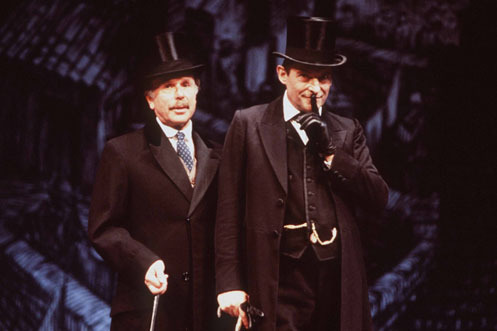The Secret Of Sherlock Holmes - Blog Posts
You do NOT want to miss this!! The Secret of Sherlock Holmes
Podcast going *in depth* on the Jeremy Brett / Edward Hardwicke stage play!!! 🎉
They've cleaned up the audio you may have heard before (on YouTube )
They describe the visuals that have been lost to time from crew interviews
They've included snippets of the crew telling backstage stories!
It was practically like being there!!
I know because I was lucky enough to actually see the play.
Part II is just commentary and is linked from this one
UPDATE: @ninasnakie asked if this was AI. I'm not sure if that means the whole play, but the the short answer is that if it was faked, it would have had better sound.
The recordings of the play (the best of which is on YouTube) were made by fans who snuck in their tape recorders, and the sound quality is pretty terrible.
So the podcaster (a reputable pro with a fantastic podcast - The Jeremy Brett Sherlock Holmes Podcast) used multiple copies to combine and cleaned it up manually and mentions in the second part that he did use AI to help clean it up, so you can make out what they're saying, and they have a really good discussion about that.
They didn't include all of the play audio, just key / most scenes and used crew interviews and descriptions / summaries in between. Even some of the key scenes are extremely difficult to hear even at maximum volume. I'm sure that a lot was completely useless.
I hope this helps!
Can I Be of Assistance? BBC Sherlock and The Secret of Sherlock Holmes

The Secret of Sherlock Holmes was a play written by Jeremy Paul, who also wrote several episodes of the Granada series. Paul and Jeremy Brett, who had been friends for two decades before this play was produced, would often talk about Sherlock Holmes and his origins. During one of these discussions, Brett commissioned this play from Paul; it contains many of Brett’s own theories about the character so many people identified with him. The play was meant to be a one-off, starring Jeremy Brett and Edward Hardwicke in their famous roles, in celebration of the 100th anniversary of A Study in Scarlet. However, it was met with such enthusiasm that it ended up running for a full year (1988/1989), rather to the detriment of Brett’s health.
As a refresher, the Granada series ran from 1984 to 1995. The first season ended with The Final Problem, and the second ended with The Bruce–Partington Plans (episodes did not follow the order of Watson’s writings or any chronological order of occurrence). The play ran between the second and third seasons.
There will be lots of spoilers below the cut, so if you’d like to experience the play before reading, please click here for an audio recording of the original performance in two parts. Unfortunately, the play was never filmed. Also unfortunately, the audio becomes very poor around 19:20 in the second audio link. I promise it never gets loud again after that (except an exclamation or two by Jeremy Brett, of course!), so feel free to turn up your volume.

Before I read The Secret of Sherlock Holmes, I expected it to be entirely in keeping with the Granada series. It’s not. The series and the play differ in tone and content. There are no cases, and Holmes and Watson are the only characters. Stories that had already been adapted in Granada turn up in the play in different forms, but only to serve their relationship. The play adapts the subtext of the stories, rather than the text, which is something Granada rarely did, and mainly in the later episodes, like The Eligible Bachelor.
In the context of Sherlock, this means that The Secret of Sherlock Holmes is a greater source than the Granada series was, because the play was original in ways that the series wasn’t (perils of being faithful to the surface narratives of the stories). I’m going to talk about how the play adapted the Doyle stories, and how those choices are reflected in Sherlock, because as we know, “Everything is canon”.
The play develops the Holmes and Watson relationship from the time they meet and move in together, until some time after Holmes returns to Watson after faking his death in the Reichenbach. Along the way, they each address the audience to tell us secrets they keep from each other; the action (so to speak) culminates in a discussion of Moriarty’s role in their lives.
Love, loss, lies, and John Watson being pretty damned smart, under the cut.
Keep reading